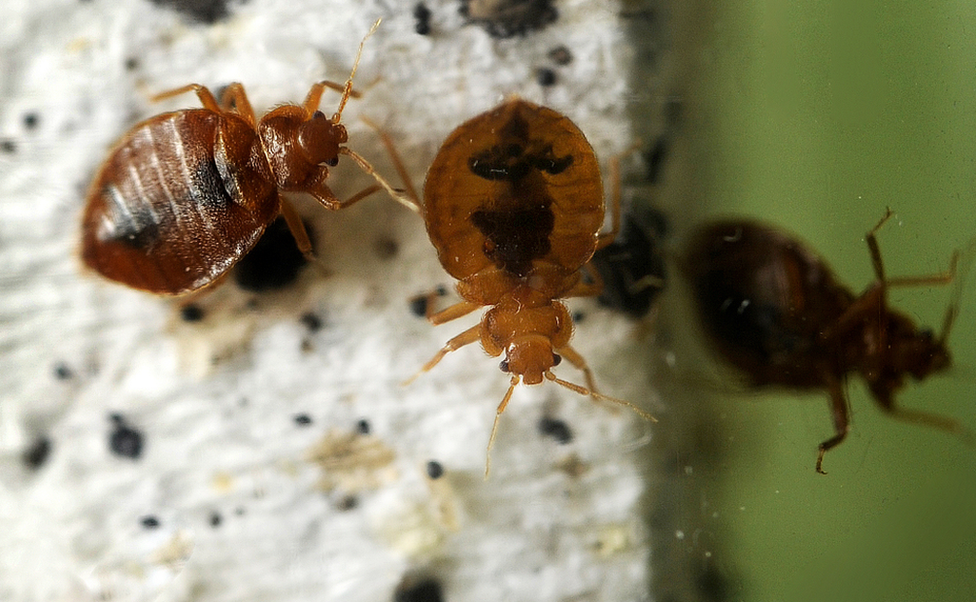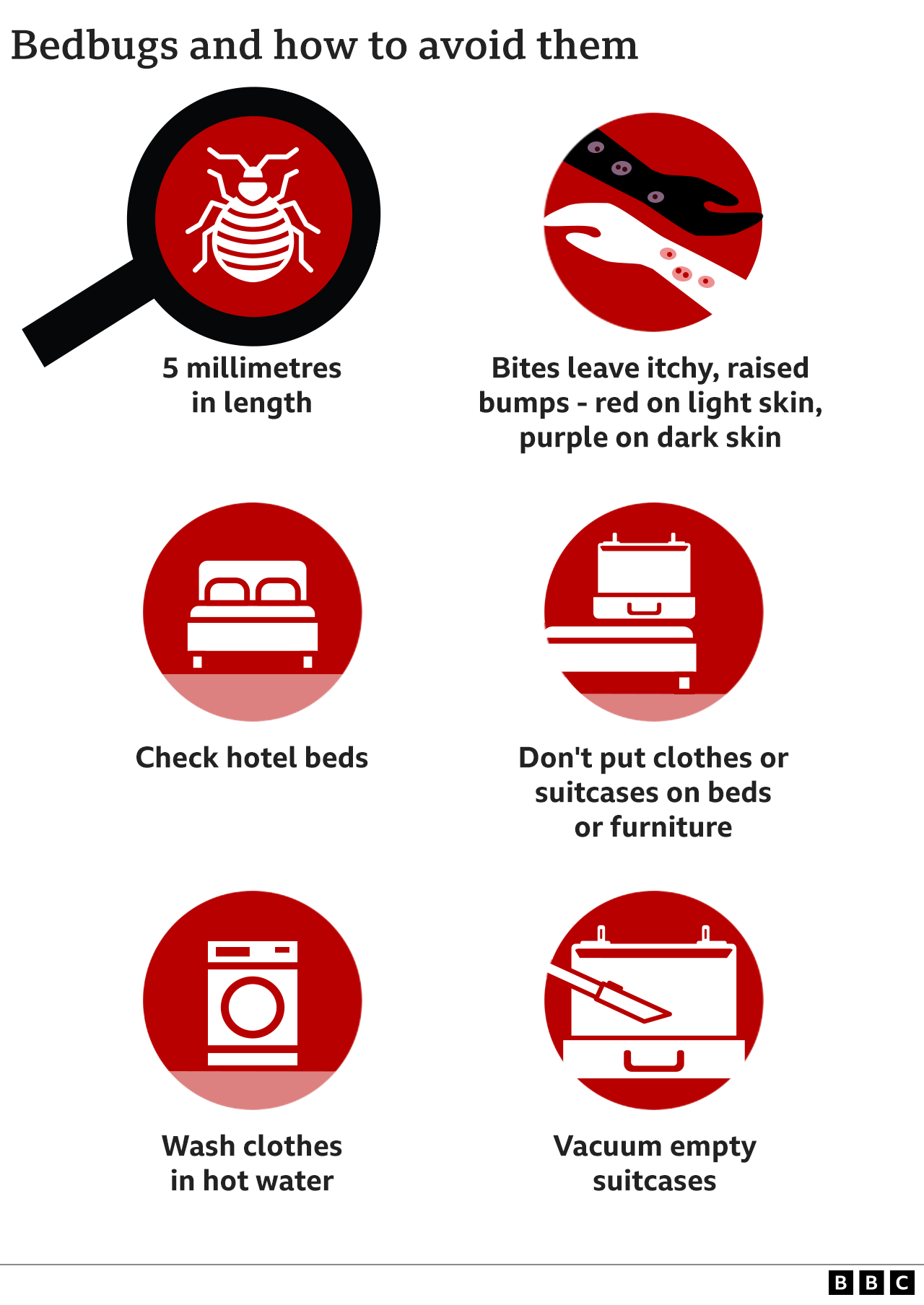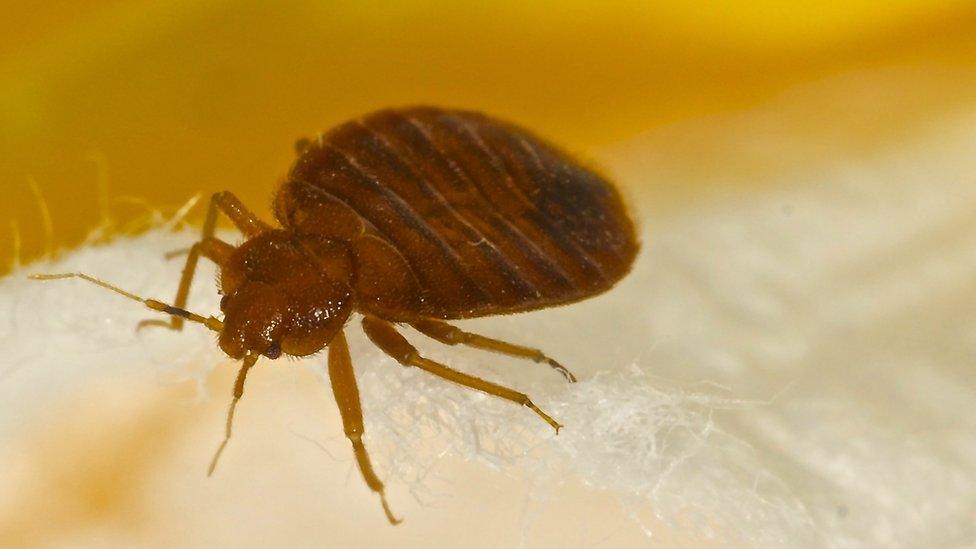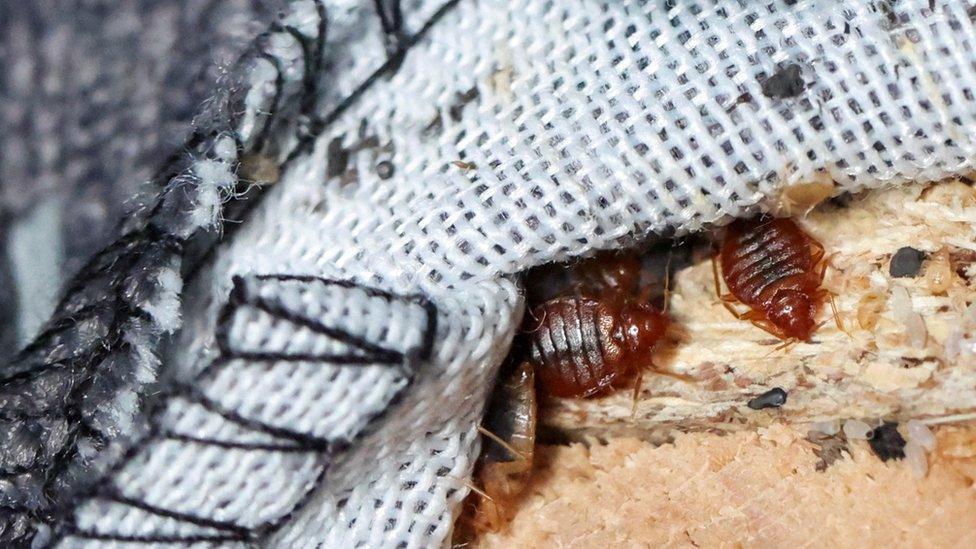Why do we itch when reading about bedbugs?
- Published

For some people, just the thought of bedbugs can make their skin crawl
Just the mere mention of bed bugs can make your your skin crawl.
Panic over the pesky pests has swept across Europe over the past couple of months, following reports of soaring infestations.
Although their bites can cause itchiness, bedbugs do not usually cause other physical health problems in humans.
However, it is the effect on one's mental health that can be most damaging - leaving some who have had infestations with anxiety, flashbacks and insomnia.
Why do some of us itch when we're just thinking and reading about bed bugs- even if we've never had an infestation?
It's all to do with the mind-body connection, says Dr Heather Sequeira, a clinical psychologist who specialises in anxiety and obsessional behaviours.
"Our brain has this remarkable ability to make associations between specific thoughts or mental images and physical sensations," she says.
"When you think about bedbugs, your brain may activate memories or mental images associated with the discomfort of getting bitten by an insect and initiate neural patterns associated with heightened awareness, leading to increased skin sensations."
Psychogenic itching - how psychologists describe an itch which has no dermatological or systemic cause - is a very common phenomenon.
But, Dr Sequeira says, the more you fear or feel disgusted by bedbugs, the more likely you are to experience it.
"By saying we all have psychogenic itching to some degree, we normalise it," she adds.
"If we are scared, anxious, or grossed out by something, our body goes on high alert to detect that potential 'threat'.
"Similarly, if we are experiencing anxiety and stress for different reasons, we are also more likely to have a stronger reaction to thinking about bedbugs".
How recent media coverage could be playing its part
Dr Sequeira says she has had more patients telling her about their bedbug-related anxieties over the past couple of months - which she attributes in part to "heightened awareness" resulting from the increased media coverage.
There have been recent reported infestations in Paris and other French cities, and a library in west London closed temporarily after the insects were discovered in the furnishings.
Dr Angharad Rudkin, a clinical psychologist who specialises in anxiety and intrusive thoughts, says for people whose "threat alert system" is already high, reading about recent outbreaks confirms in their minds that it could soon become a reality for them too.
"[They think] 'It has happened in Paris and it could happen to me'," she says.

Dr Rudkin also says the experience is very normal but is worse for people who have anxiety disorders.
"All of us are getting that slightly itchy feeling," she says.
"Depending on your mental health, if you are feeling quite relaxed it will not be more than a passing thought, but if catches you when you are stressed or tired it can get a bit stickier."
The problem can be compounded at the thought of your bedroom no longer being a place of safety.
"Finding a spider in your bed is far worse than finding it in a bathroom," Dr Rudkin says.
The descendants of worriers
One school of thought which explains why some of us react in this way is our survival instincts, Dr Rudkin explains.
"The people who were a little bit on edge and had their threat alert on high were the ones who survived," she says.
"We are the descendants of worriers, so our bodies are wired to respond in this way."
Dr Abigael San, who specialises in cognitive therapy, says the itching sensation is about imagery.
"When the image of something is really meaningful for you, especially if it carries threatening information, your brain is doing the same thing as if it was really there," she says.
"It's not just bedbugs, looking at a spider will give you that sensation of feeling like a spider is crawling on you - you know it's not there but the sensation is there.
"For a lot of people who are scared of bugs, just conjuring up an image can feel really, really scary.
"The part of your brain dealing with fear and threat will light up in the same way as if the physical thing was in front of you."
Dr San has worked with a patient who she says was "traumatised" by her experience with bedbugs.
"She was not someone who had a fear of bugs before, for her it was the trauma that it carried," she says.
"The trauma was about other stuff - the pest control person, her feeling blamed.
"For her, looking at an image of bedbugs will provoke feelings of anger and shame."

How are bedbugs affecting your life? Share your experiences by emailing haveyoursay@bbc.co.uk, external.
Please include a contact number if you are willing to speak to a BBC journalist. You can also get in touch in the following ways:
WhatsApp: +44 7756 165803
Tweet: @BBC_HaveYourSay, external
Please read our terms & conditions and privacy policy
If you are reading this page and can't see the form you will need to visit the mobile version of the BBC website to submit your question or comment or you can email us at HaveYourSay@bbc.co.uk, external. Please include your name, age and location with any submission.
Related topics
- Published5 October 2023

- Published3 October 2023
